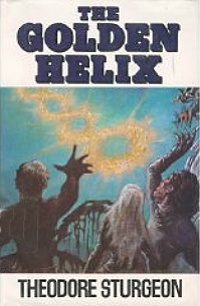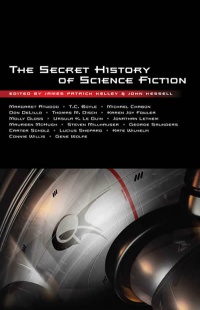 If you’ve read many of my reviews, you may have noticed I’ve said repeatedly that my preference is for novels, and I don’t generally find many short stories to my liking. However, I have set myself the task of reading more stories, in light of the role they’ve played in the history of science fiction. So it has become my habit lately to always have a short story collection thrown into the mix of two or three books I’m reading at any given time (and anyway, I have a short attention span when reading, so it’s good to take several breaks during a novel and read a few stories).
If you’ve read many of my reviews, you may have noticed I’ve said repeatedly that my preference is for novels, and I don’t generally find many short stories to my liking. However, I have set myself the task of reading more stories, in light of the role they’ve played in the history of science fiction. So it has become my habit lately to always have a short story collection thrown into the mix of two or three books I’m reading at any given time (and anyway, I have a short attention span when reading, so it’s good to take several breaks during a novel and read a few stories).
The Golden Helix (1979) is a collection of stories by Theodore Sturgeon. Oddly enough, when it comes to Sturgeon, I realize now that I’ve never read anything but his short stories. In my early teen years I had a copy of Sturgeon Is Alive and Well that I found in a box of old books from a yard sale. At the time, I thought Sturgeon was just bizarre, and I’m not sure I understood much of what I read (I had not had a lot of experience with sf at that point). But still, there was something strangely compelling about those stories, some feeling they gave me that I can’t really describe. There were certain scenes in some stories I went back and read over and over again, just for their texture or emotion or style, even when the plot didn’t interest me much.
For the most part, I didn’t get quite that same feeling from The Golden Helix. Possibly that’s because many of these stories are from early in Sturgeon’s career (they are predominantly from the 1950’s), and the author himself, in his short introductory notes, admits the quality level is sometimes not up to later standards. It’s also possible I read this collection with a more critical eye, as an adult, than I did when I first read Sturgeon as a teenager with a fully charged “sensawunda.” At any rate, there were some good stories here, but also some that didn’t do a thing for me.
Let me say, though, that there was one shining example of a fantastic short story here, one of the best short stories I have ever read, a little gem called “The Man Who Lost the Sea.” This is, to me, a model of one type of thing a short story should strive for. It’s not plot-driven at all, in fact there really isn’t much of a plot. Rather, it’s a short piece built around the atmosphere and poignancy of a situation a man finds himself in. It has a kind of compact, self-contained, poetic wholeness to it; this is to short stories what a haiku is to poetry. Loved it. (Sturgeon himself had a different opinion, though. He said he told his editor to burn the story, but that it got published and ended up in a “best of the year” anthology. Go figure.)
A few other stories were also of interest. “And Now the News…” takes a look at what constant negative news does to a man who cares deeply about the world. “The Clinic” involves some aliens with disabilities who feel right at home on Earth. “The Ultimate Egoist” is a fun story built around the philosophical question of how real the world is, and if it really is only a figment of our imagination. “Yesterday Was Monday” is a humorous look at time and how it doesn’t just “happen.”
The title story was by far the longest, and one of those I didn’t like. It is partly based on the silly concept of “devolution,” one of the worst ideas sf ever came up with, and one that needs to quietly go away. The four remaining stories were likewise of little or no value to me. “I Say… Ernest” has to be one of the most utterly pointless stories I’ve ever come across.
This collection was worth reading, for me, because it allowed me to discover “The Man Who Lost the Sea,” and also because even if I don’t always like the details of plot or character, I still enjoy Sturgeon’s style. I do think, though, that next time around I’ll try one of his novels.














